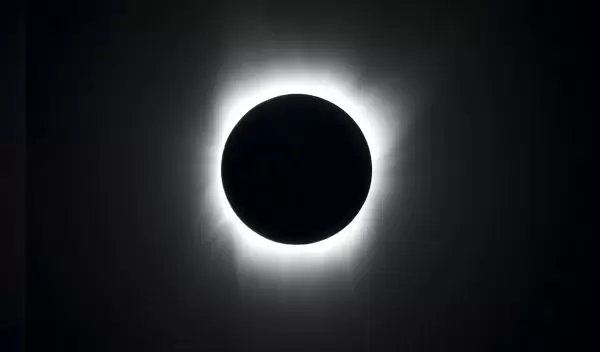
National Science Foundation prepares activities and educational resources for April’s solar eclipse
The U.S. National Science Foundation (NSF) in collaboration with agency partners will serve as a major source of information, educational activities and experiences on and around the total solar eclipse taking place on April 8, 2024. The next total solar eclipse will not be visible in the contiguous United States until 2044, so this is a once-in-a-generation event of astronomical magnitude.
NSF will celebrate the eclipse in Dallas, Texas, which falls within the path of totality (the area where a full eclipse can be viewed); in Washington, D.C (outside the path of totality); and in locations across the country. For those who cannot attend an in-person viewing, NSF will host a livestream of the eclipse featuring scientists who study the sun and some of the high-tech facilities they use, including the NSF Daniel K. Inouye Solar Telescope at the National Solar Observatory.
Prior to the eclipse, NSF, in partnership with NOAA and NASA, is making 1 million solar eclipse glasses available to the public. The glasses are being distributed nationwide and will be available on the National Mall the day of the eclipse while supplies last.
Leading up to the eclipse, NSF will host multiple outreach events at public libraries, museums and observatories across the country, many of which are free and open to the public. At these events, eclipse-related educational material will be available to teachers, parents and caregivers. NSF also offers many educational resources and activities on the science of eclipses.
For more information, visit Total Solar Eclipse 2024 | NSF - National Science Foundation.
Solar Eclipse Viewing Events (April 8)
Washington, D.C.
Solar Eclipse Festival on the National Mall
FREE event
Event runs from 12:00 - 4:00 p.m. EDT (between 7th and 12th Streets, NW)
On April 8, in conjunction with the Smithsonian’s National Air and Space Museum, NSF will participate in the "Solar Eclipse Festival on the National Mall," in Washington, D.C. This event, presented in collaboration with the Smithsonian, NASA, NOAA and the National Radio Astronomy Observatory, will run from 12 to 4 p.m. Attendees will be able to participate in many activity stations and view the sun using a variety of safe telescopes. The eclipse will be visible in the Washington, D.C., area between 2:04 p.m. and 4:32 p.m. Maximum eclipse will be at 3:20 p.m., with the sun 87% covered by the moon. A limited supply of solar eclipse glasses will be available for event attendees. The "Solar Eclipse Festival on the National Mall" is made possible by the generous support of Phillip N. and Mary A. Lyons.
Dallas, Texas
Fair Park Cotton Bowl® Stadium
Sun, Moon, and You Solar Eclipse Viewing Event
FREE event but must register for a ticket
Gates open at 8:30 a.m. CDT; show starts at 9:30 a.m. CDT
Totality is from 1:40 - 1:44 p.m. CDT
On April 8, NSF, NOAA and NASA will host the "Sun, Moon, and You Solar Eclipse Viewing Event" at the Fair Park Cotton Bowl® Stadium in downtown Dallas, with special guest speaker Neil deGrasse Tyson, American astrophysicist and writer, and educational entertainment from the PBS television series "Ready, Jet, Go!" Experts from NSF, NOAA and NASA will talk about the science of the eclipse, space weather, and why we study the sun. Multiple STEM organizations will be on-site throughout the stadium’s concourse, providing activities and handouts, and telescopes will be available for viewing the eclipse as well as food for purchase. Tickets are available here.
Livestream
For those not in the path of the solar eclipse on April 8, NSF is hosting an educational livestream featuring scientists who study the sun and the high-tech facilities they use. The livestream will be geared toward school-aged children and is a free resource that teachers can use in their classrooms. Watch NSF's eclipse livestream here.
Other Eclipse Events (on and prior to April 8)
NSF and partnering organizations across the country will also host a variety of educational and outreach events on and leading up to the total solar eclipse on April 8. Many of these events will feature solar and space experts, presentations, and activities that are free and open to the public.
For updates, please consult Total Solar Eclipse 2024 | NSF - National Science Foundation.


